Meet Professor Emeritus Trevor R. Parmenter, 86, whose title reflects his esteemed contributions to the field of disability studies. His decades of research and training have informed his efforts to transform the disability landscape and pave the way for a more inclusive society. Prof. Parmenter speaks to NG WENG LIN about his passion for improving the quality of life of individuals with lifelong disabilities.
How did you come to work in this space?
Many people think I chose this career because I have close relatives who were born with complete hearing loss. However, I never saw them as being disabled. They were well-educated and their impairment generally did not become a disability.
How I entered this sector was actually purely accidental. Having taught in one-teacher schools in rural Australia for 11 years, I was appointed to work with students with various impairments/disabilities in high schools in Sydney in 1964. Subsequently, I was appointed as Principal of a Special School for students with intellectual disabilities. This led to my being invited to join the foundation teaching staff in the Special Education Centre at Macquarie University in 1974, having at that time completed 21 years teaching in schools. I undertook a teaching and research career, providing special education training for trainee teachers and related disciplines.
Prof. Parmenter on the front steps of Armidale Teacher’s College, where he first commenced his teacher training in 1951.
My experiences in teaching students with disabilities in high schools drew me to focus my research career upon their post school lives in areas such as employment and community living. The 1970s saw the beginnings of a worldwide movement which led to the closure of large residential institutions and giving people with disabilities—especially those with intellectual and related impairments—the chance to live a more normal life in community settings. Now 50 years later, this movement is still underway in many countries. In 1997, I was appointed the Foundation Professor of Developmental Disability in the Sydney Medical School at the University of Sydney and Director of the newly established Centre for Developmental Disability Studies, until my retirement at the end of 2009. Since then, I have continued my research and teaching interests, albeit at a slower pace.
Your work has touched on the idea of "Positive Ageing". Please tell us a little more about this and why it is important.
Having committed my research interests to helping people with disabilities meet their support needs across their life-span, and the fact that their life expectancy was approaching that of the general population, drew me to research their specific needs as older people. In the majority of cases, they continued to live with their parents who were also ageing. Committed to the principle that research needs to be embedded in a sound theoretical basis, I explored the history of gerontological theories. One emphasised “healthy ageing” and another “successful ageing”, but these did not strike me as being comprehensive enough, particularly as they appeared to be driven largely by health concerns. This drew me to the emerging concept of “positive ageing” which reflected the demographic trend towards longer life expectancy for all.
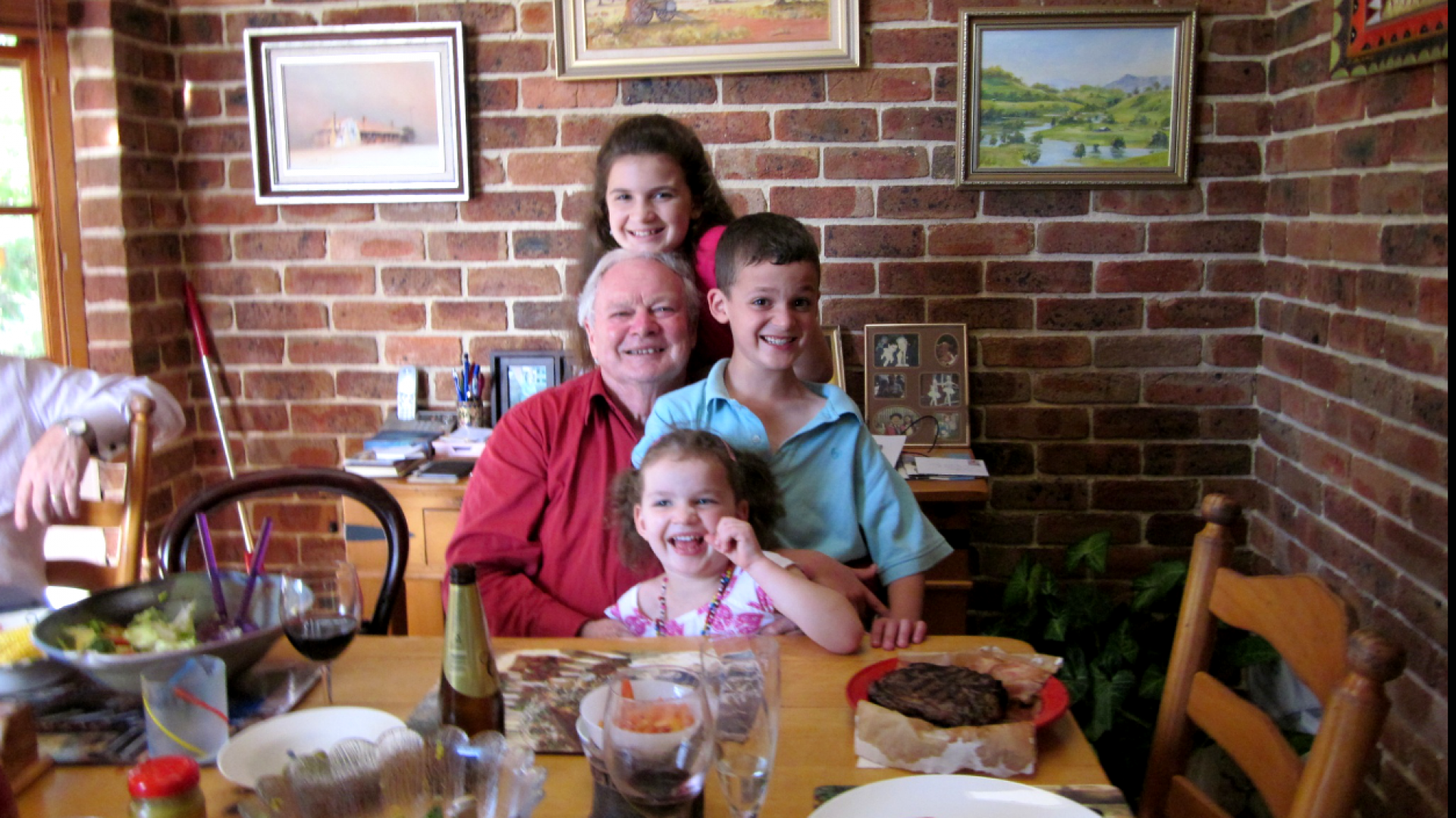
Prof. Parmenter with his grandchildren.
This principle recognised that throughout one’s life we move through a number of life phases, until at some point we move into a retirement phase. We need to recognise this is just another phase where we continue to seek life fulfilment, possibly in different ways from the earlier phases. So ageing is just another phase in our lives where we can still experience the positive aspects of a “good life”. Even though we may experience more health challenges, these do not necessarily preclude us from enjoying life.
What does having dignity mean to you, in the context of people with disabilities and ageing?
In practice, this means affording these people the same dignity as we would wish if we were in the same position. I have written much on the concept of “identity” formation for people with lifelong disabilities. Intrinsically, having a feeling of self-worth is crucial to our own dignity and feeling of well-being. For those with lifelong disabilities who are now ageing, there is often not the realisation that they are entering a new stage of their lives. This is particularly the case for those who have not experienced the life stages similar to those of us in the general community. Their lives have been much of “sameness”, because they have so often been segregated into separate “programmes”, almost from birth. So, for many the realisation of ageing is when they can no longer attend their sheltered workshop, because their productivity is not up to standard. We need to provide them with the same dignity as we would for people in the general community who are ageing. Even in cultures where people who are ageing are respected, this is so often not the case with people with disabilities who are ageing. Their ageing is often seen as a burden on society.
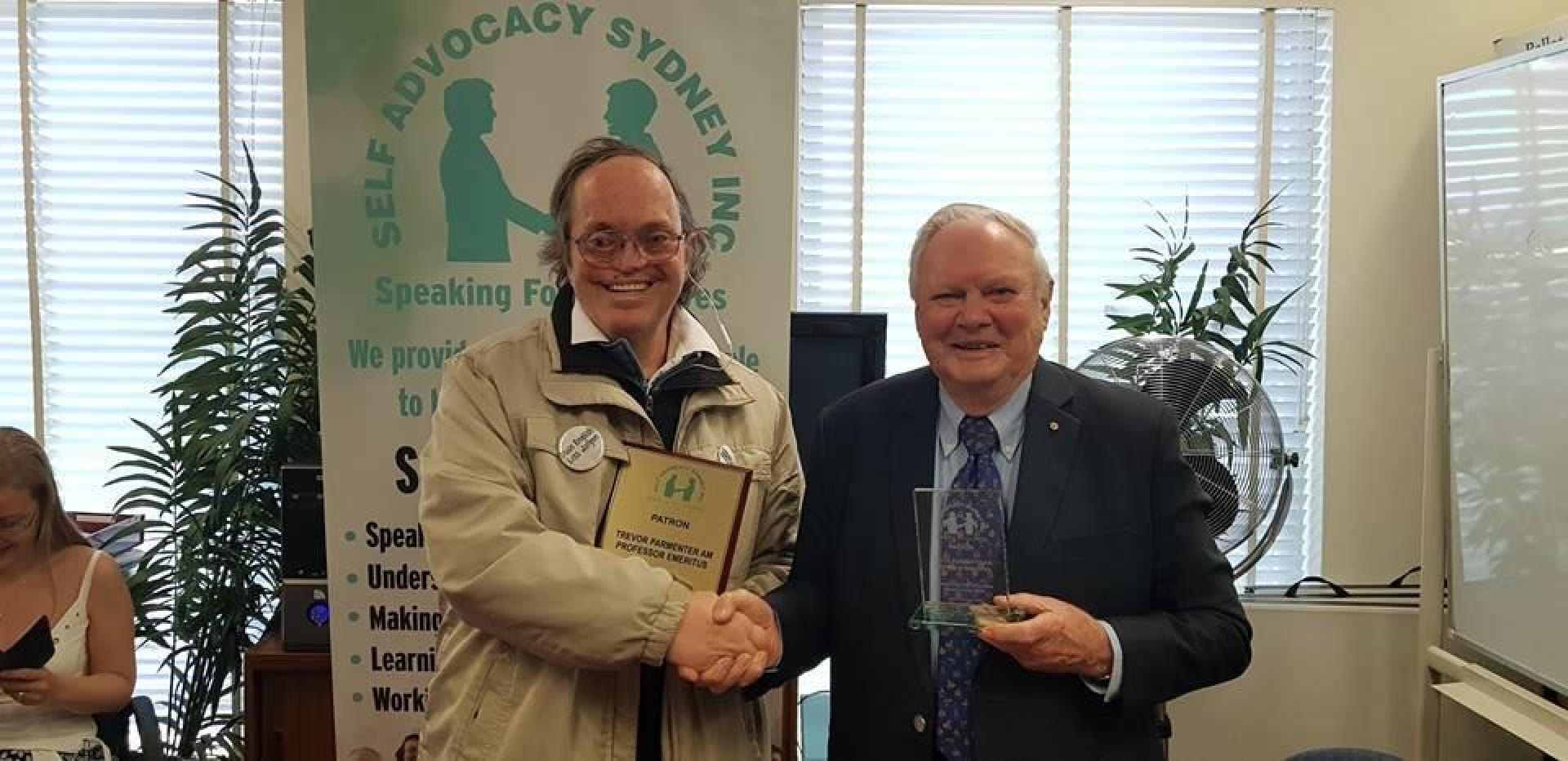
Prof. Parmenter was presented with the J. Moss Award for his “outstanding work in the field of Intellectual Disability” by Mr Robert Strike AM, founder of Self Advocacy Sydney, a disability services and support organisation of which Prof. Parmenter is himself a Patron.
What are some of your most memorable moments while conducting research in the community?
Meeting people with disabilities who have overcome immense challenges both as a result of their impairments and how they have accommodated to the negative attitudes of people in the community. Their resilience has been inspirational. It has been equally thrilling to witness the strength of families as they struggle to support their loved ones throughout life. So many have overcome the initial disappointment of their child’s impairments, and they go on to celebrate that life as much, if not more, as they do for their other children. It is always a joyous occasion to witness positive responses from community members who get to be genuine friends with their neighbours with disabilities.
.jpg)
Prof. Parmenter (centre) and the medical rehabilitation staff of Bach Mai Hospital in Hanoi, Vietnam, where he gave a lecture on autism in 2018.
Has your work with people with disabilities over the years given you any fresh perspectives or insights? If so, please share them with us.
The most important feature is to come to the realisation that people with disabilities are a vital reflection of the whole human condition. Their intrinsic humanity challenges us all to reflect upon our own humanity. In most cases, we shall all experience a disability at some stage in our lives, so we need to identify with those with lifelong disabilities with much humility. This should bring us to the realisation that those of us with gifts should reach out to share them with people who haven’t had the same luck or opportunities as we have had.
A conversation in 2010 with Professor Roy Brown (left) during the Festschrift given in honour of Prof. Parmenter’s life’s work.
During your long career, what were some moments that moved you or left a lasting impression?
Seeing the results of how my teaching was able to transform the lives of children and adults who had difficulties in learning was deeply rewarding. For instance, teaching a child to read, even after their years of failure. Teaching young teachers who have gone on to become highly skilled special educators. Seeing the scholars whom I have supervised for their PhD studies go on to have large impacts on disability policies and practices, and some who have become respected professors in University Departments. Possibly, the most exciting experience is seeing former students whom I taught in those special classes and my special school years, now being able to enjoy a good life in the regular community. But of course, there are some who have not had a similarly wonderful life, and that is why I am motivated to keep fighting for them to enjoy the same life opportunities which we all can experience.
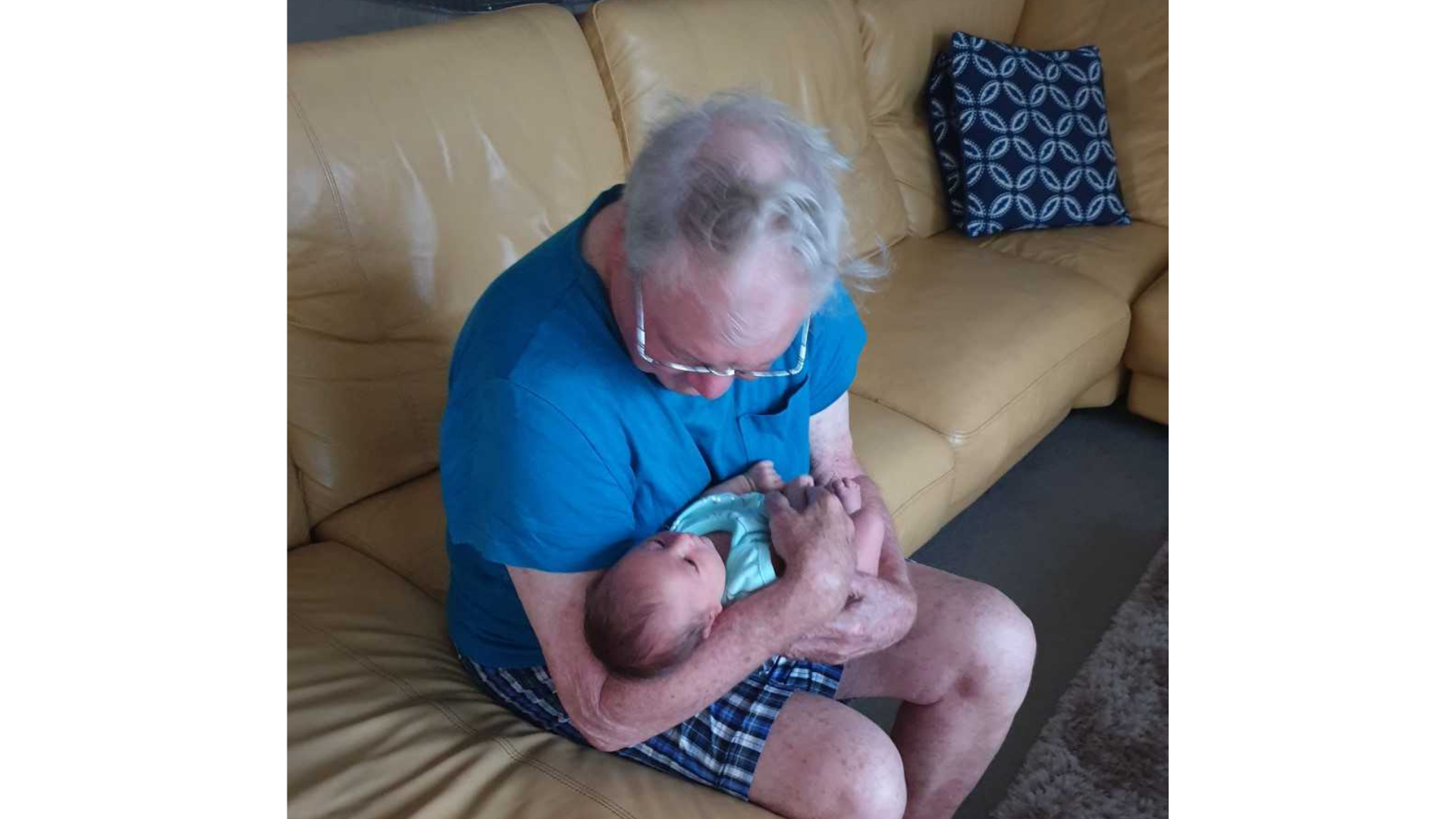
A precious moment between a proud grandfather and his youngest granddaughter.
Do you see some promising trends emerging from this field of work, and what kind of positive changes do you hope to see in the future?
I have seen many improvements in the people with disabilities and their families are being supported since I entered the disability field in 1964. Many now have access to better early intervention, educational opportunities, and better access for support for living in the community.
However, challenges remain. In education, effective support to both students and teachers for the achievement of real inclusive education is still elusive. Obtaining a real job in the community also still presents insuperable barriers, despite the abundant evidence that people with disabilities can be able, loyal employees. The challenges people with lifelong disabilities are now facing as they age, together with their parents, are presenting now as a new issue, but others and I foreshadowed this as an emerging challenge back in the 1990s.
.jpg)
Prof. Parmenter retired as Director of the Centre for Disability Studies in December 2009.
We also need to overcome what can only be described as policy inertia. So often we recognise impending challenges, but we remain comfortable with the status quo. We must be more aggressive in our advocacy for what is right and just for people disadvantaged by an impairment.
Our lifetime goal should be to ensure that an impairment does not become a disability, restricting the opportunities for people to participate in activities of their choosing and to lead a fulfilling life.
How do you respond to challenges?
I try to be positive, analyse the situation carefully; I do not hasten, but reflect on the best strategy to resolve the challenge. Especially on personal matters, I seek support from my faith as well as by turning to loved ones and friends.
.jpeg)
Prof. Parmenter with his wife Marie (far left), youngest daughter Sophie and granddaughter Amelie.
Who or what inspires you?
The person who has had the biggest impact on my life as a teacher and researcher in the field of disability was the late Bengt Nirje, a Swedish philosopher/scholar who became my friend and mentor. Bengt saw the real humanity of people with immense disadvantages; from refugees from Nazi concentration camps to people with lifelong disabilities. His exhortation that these people should be given the same opportunities to experience similar patterns of life as others remains relevant today, as it did in the 1970s. This was the key to his writings on the Principle of Normalization. Bengt also asserted that people with disabilities should be given the opportunity to “be themselves among others”. This teaches us that, for some people, their impairment is a barrier to their acceptance of conformity, and we should accept their difference. Bengt truly deserved the honour of the accolade, “The Father of the Normalization Principle”.
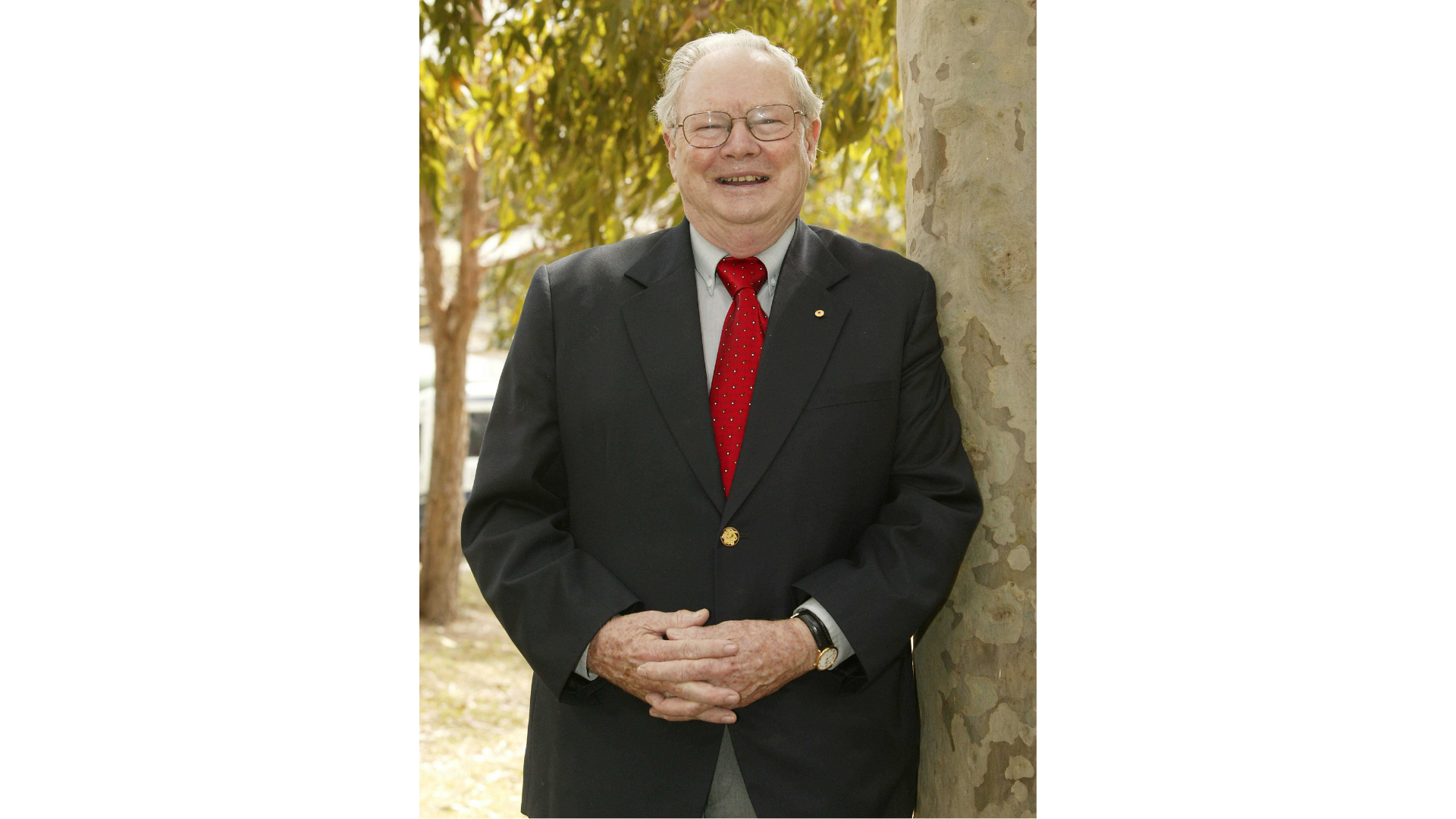
Taken in celebration of his being awarded the Member of the Order of Australia (AM) in 2005, for Prof. Parmenter's contributions to research, teaching and advocacy in the field of Intellectual Disabilities
How should we keep the conversation going on disability and quality of life?
As a first step, ask the question of what you value in your life which enhances its quality? Then ask the same question to a person with a lifelong disability. You might be surprised that many will have similar thoughts. If you are a provider of support services, measure the outcomes of that support on whether it has improved the person’s well-being or quality of life. So often, the measures imposed by funders of that support relate to administrative compliance indices. Good compliance with regulations does not necessarily result in good life outcomes for the people being supported.
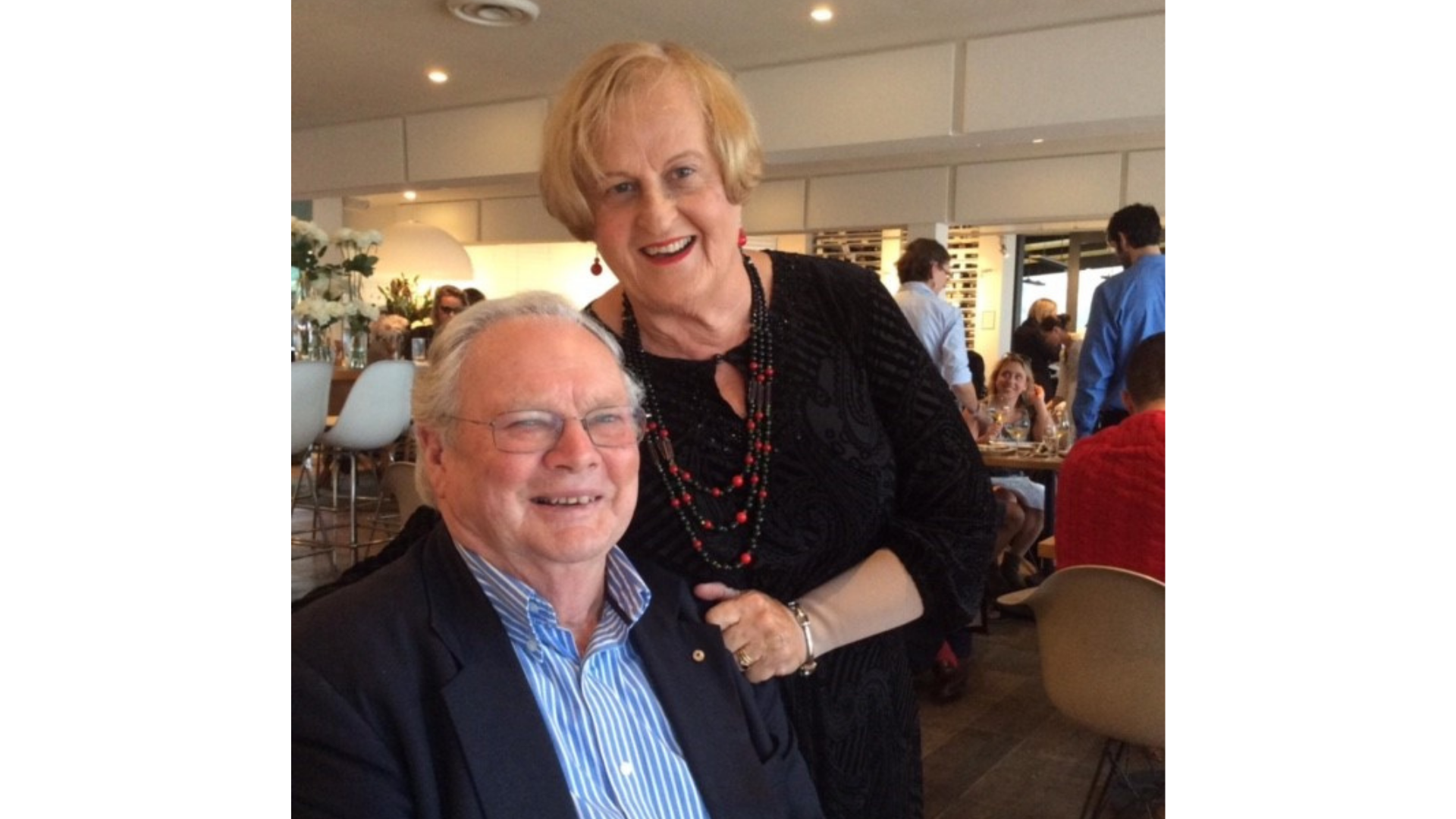
With his wife, Marie.
As community members, we must not take comfort in the fact that support agencies “look after” these disadvantaged fellow community members. We should continually ask ourselves if we would like the same type of “being looked after”. And it is not sufficient to make a donation and think that is sufficient to assuage our feelings of pity; and nor should it comfortable for us to be content that the Government is doing its best to provide support.
We must continue to ask the question: would I like the same quality of life that is being experienced by people with disabilities?
Where do you see yourself in the next few years?
I continue to enjoy research and teaching as my form of “retirement”, and I anticipate that will continue. Already, I do have some commitments planned into the future. I keep mentally and physically alert, with many relaxation activities with family and friends. Sharing ideas and being challenged is stimulating. My former Research Centre now has is second Director since I left at the end of 2009, and I shall continue to support its research and teaching activities.
.jpg)
Professor Trevor (right in top photo, left in second) with his PhD students at their graduation ceremonies at the University of Sydney.
And finally, if you had to pick three values you hold dear, which would they be?
Respect, trust and commitment to the dignity of all human beings.
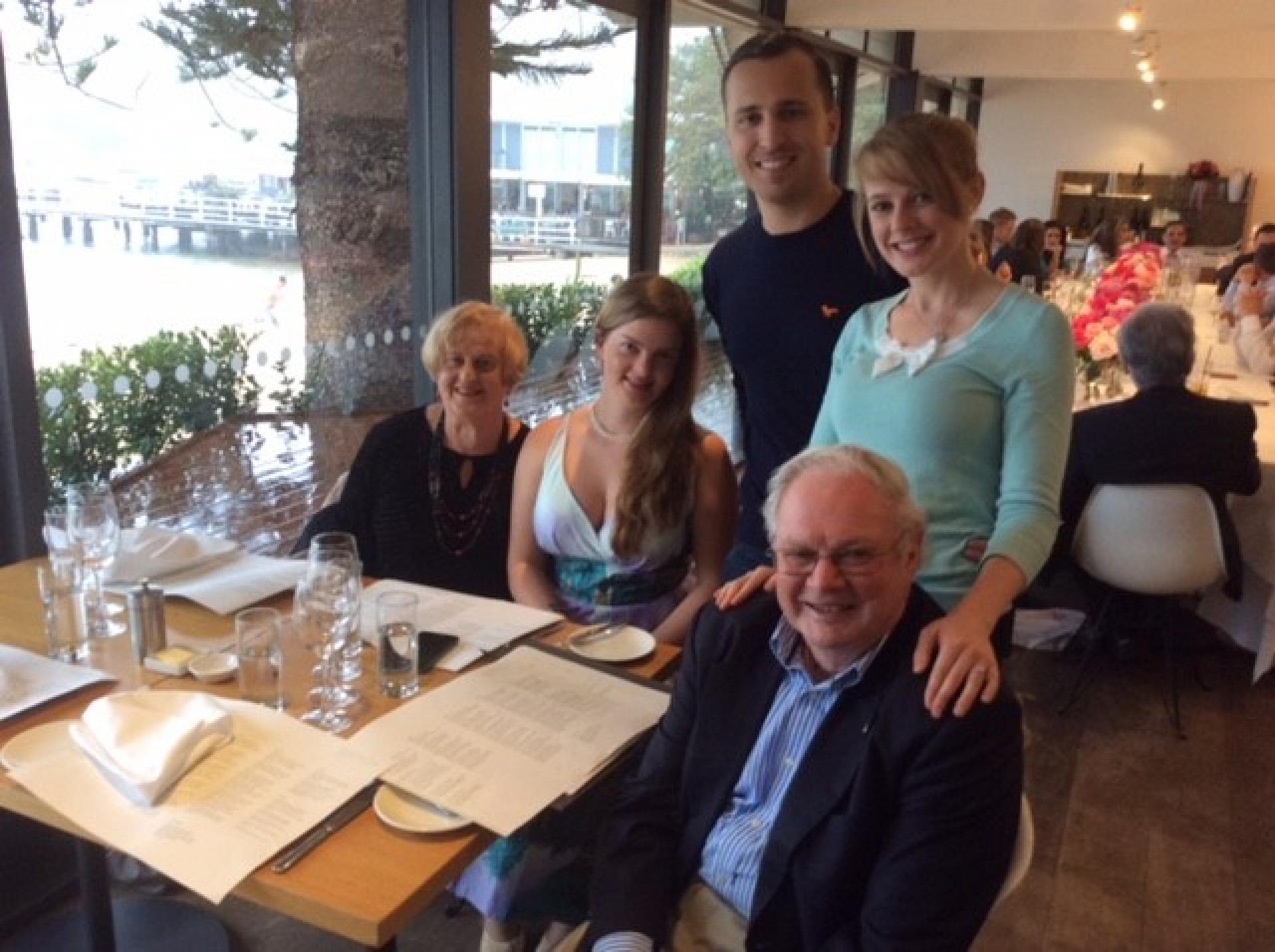
Prof. Parmenter and his family.
All images courtesy of Prof. Parmenter.








Comments